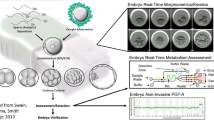Abstract
Purpose
Expanded carrier screening (ECS) is an available component of preconception and prenatal care. There is complexity around offering, administering, and following-up test results. The goal of this study is to evaluate current physicians’ utilization and attitudes towards ECS in current practice.
Methods
This was a prospective qualitative survey study. A 32-question electronic survey was distributed during a 1-year period to obstetricians-gynecologists who were identified using a Qualtrics listserv database.
Results
While more than 90% of physicians offered ethnic-based carrier screening (CS), ECS was offered significantly less (2010, 20.6%, and 2016, 27.1%). Physicians who were not fellowship-trained in reproductive endocrinology and infertility (REI) preferred ethnic-based carrier screening (95.9 vs 16.8%; P < 0.001). REI subspecialists were more likely to offer ECS (80%) compared to 70% of maternal fetal medicine physicians (MFM). Physicians were comfortable discussing negative results (53.6%) compared to positive results (48.4%). Most physicians (56%) believed that ECS should not be offered until the significance of each disease is understood; 52% believed that testing should be restricted to those conditions important to couples; while 26% felt that testing should be done regardless of the clinical significance.
Conclusions
Discussion and application of ECS has increased in clinical practice. However, lack of comfort with counseling and varying beliefs surrounding ECS continue to hinder its utilization. Further education and training programs, and subsequent evaluation are warranted.
Similar content being viewed by others
References
Simpson JL. Choosing the best prenatal screening protocol. N Engl J Med. 2005;353(19):2068–70.
Kaback MM. Population-based genetic screening for reproductive counseling: the Tay-Sachs disease model. Eur J Pediatr;159 Suppl 3:S192–5.
Cousens NE, Gaff CL, Metcalfe SA, Delatycki MB. Carrier screening for beta-thalassaemia: a review of international practice. Eur J Hum Genet. 2010;18(10):1077–83.
Bajaj K, Gross SJ. Carrier screening: past, present, and future. J Clin Med. 2014;3(3):1033–42.
Committee Opinion No. 691. Summary: carrier screening for genetic conditions. Obstet Gynecol. 2017;129(3):597–9.
Bell CJ, Dinwiddie DL, Miller NA, Hateley SL, Ganusova EE, Mudge J, et al. Carrier testing for severe childhood recessive diseases by next-generation sequencing. Sci Transl Med. 2011;3(65):65ra4.
Kingsmore S. Comprehensive carrier screening and molecular diagnostic testing for recessive childhood diseases. PLoS Curr. 2012;02:e4f9877ab8ffa9.
Tanner AK, Valencia CA, Rhodenizer D, Espirages M, Da Silva C, Borsuk L, et al. Development and performance of a comprehensive targeted sequencing assay for pan-ethnic screening of carrier status. J Mol Diagn. 2014;16(3):350–60.
Janssens S, Chokoshvili D, Vears D, De Paepe A, Borry P. Attitudes of European geneticists regarding expanded carrier screening. J Obstet Gynecol Neonatal Nurs. 2017;46(1):63–71.
Lau TK. Obstetricians should get ready for expanded carrier screening. BJOG. 2016;123(Suppl 3):36–8.
Wilkins-Haug L, Erickson K, Hill L, Power M, Holzman GB, Schulkin J. Obstetrician-gynecologists’ opinions and attitudes on the role of genetics in women's health. J Womens Health Gend Based Med. 2000;9(8):873–9.
Edwards JG, Feldman G, Goldberg J, Gregg AR, Norton ME, Rose NC, et al. Expanded carrier screening in reproductive medicine-points to consider: a joint statement of the American College of Medical Genetics and Genomics, American College of Obstetricians and Gynecologists, National Society of Genetic Counselors, Perinatal Quality Foundation, and Society for Maternal-Fetal Medicine. Obstet Gynecol. 2015;125(3):653–62.
Morgan MA, Driscoll DA, Mennuti MT, Schulkin J. Practice patterns of obstetrician-gynecologists regarding preconception and prenatal screening for cystic fibrosis. Genet Med. 2004;6(5):450–5.
Janssens S, De Paepe A, Borry P. Attitudes of health care professionals toward carrier screening for cystic fibrosis. A review of the literature. J Community Genet. 2014;5(1):13–29.
Benn P, Chapman AR, Erickson K, Defrancesco MS, Wilkins-Haug L, Egan JF, et al. Obstetricians and gynecologists’ practice and opinions of expanded carrier testing and noninvasive prenatal testing. Prenat Diagn. 2014;34(2):145–52.
Ready K, Haque IS, Srinivasan BS, Marshall JR. Knowledge and attitudes regarding expanded genetic carrier screening among women’s healthcare providers. Fertil Steril. 2012;97(2):407–13.
Brooks DJ. Differences in patient screening mammography rates associated with internist gender and level of training and change following the 2009 U.S. Preventive Services Task Force Guidelines. J Natl Compr Cancer Netw. 2016;14(6):749–53.
Delgado A, Saletti-Cuesta L, Lopez-Fernandez LA, Gil-Garrido N, Luna Del Castillo Jde D. Gender inequalities in COPD decision-making in primary care. Respir Med. 2016;114:91–6.
Tsugawa Y, Jena AB, Figueroa JF, Orav EJ, Blumenthal DM, Jha AK. Comparison of hospital mortality and readmission rates for Medicare patients treated by male vs female physicians. JAMA Intern Med. 2017;177(2):206–13.
De Wert GM, Dondorp WJ, Knoppers BM. Preconception care and genetic risk: ethical issues. J Community Genet. 2012;3(3):221–8.
Raz AE, Vizner Y. Carrier matching and collective socialization in community genetics: Dor Yeshorim and the reinforcement of stigma. Soc Sci Med. 2008;67(9):1361–9.
Marshall KP. Has technology introduced new ethical problems? J Bus Ethics. 1999;19(1):81–90.
Acknowledgments
L. Ashley Duckworth, Wright State University, no conflict of interest.
Funding
Steven R. Lindheim, MD, MMM received a grant from Progenity®, San Diego, CA. Study funded by Progenity®, unrestricted research grant.
Author information
Authors and Affiliations
Corresponding author
Ethics declarations
Conflict of interest
There was no involvement by Progenity in writing this manuscript. The remaining authors report no conflict of interest.
Military disclaimer
The statements made in this article are not a reflection of the United States Government or Military positions or opinions.
Appendix A
Appendix A





Rights and permissions
About this article
Cite this article
Briggs, A., Nouri, P.K., Galloway, M. et al. Expanded carrier screening: a current survey of physician utilization and attitudes. J Assist Reprod Genet 35, 1631–1640 (2018). https://doi.org/10.1007/s10815-018-1272-8
Received:
Accepted:
Published:
Issue Date:
DOI: https://doi.org/10.1007/s10815-018-1272-8



